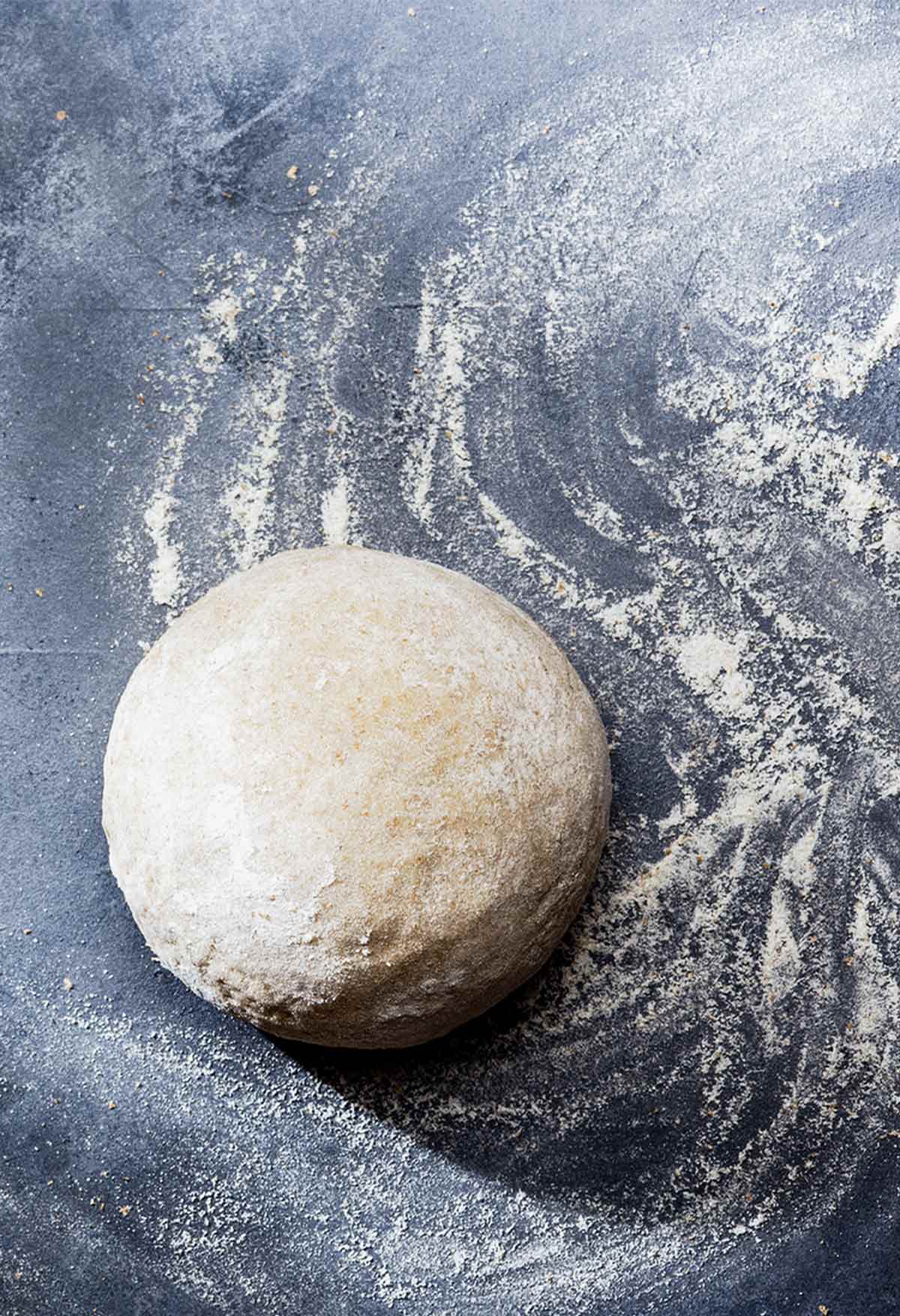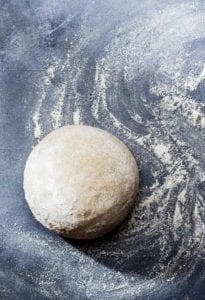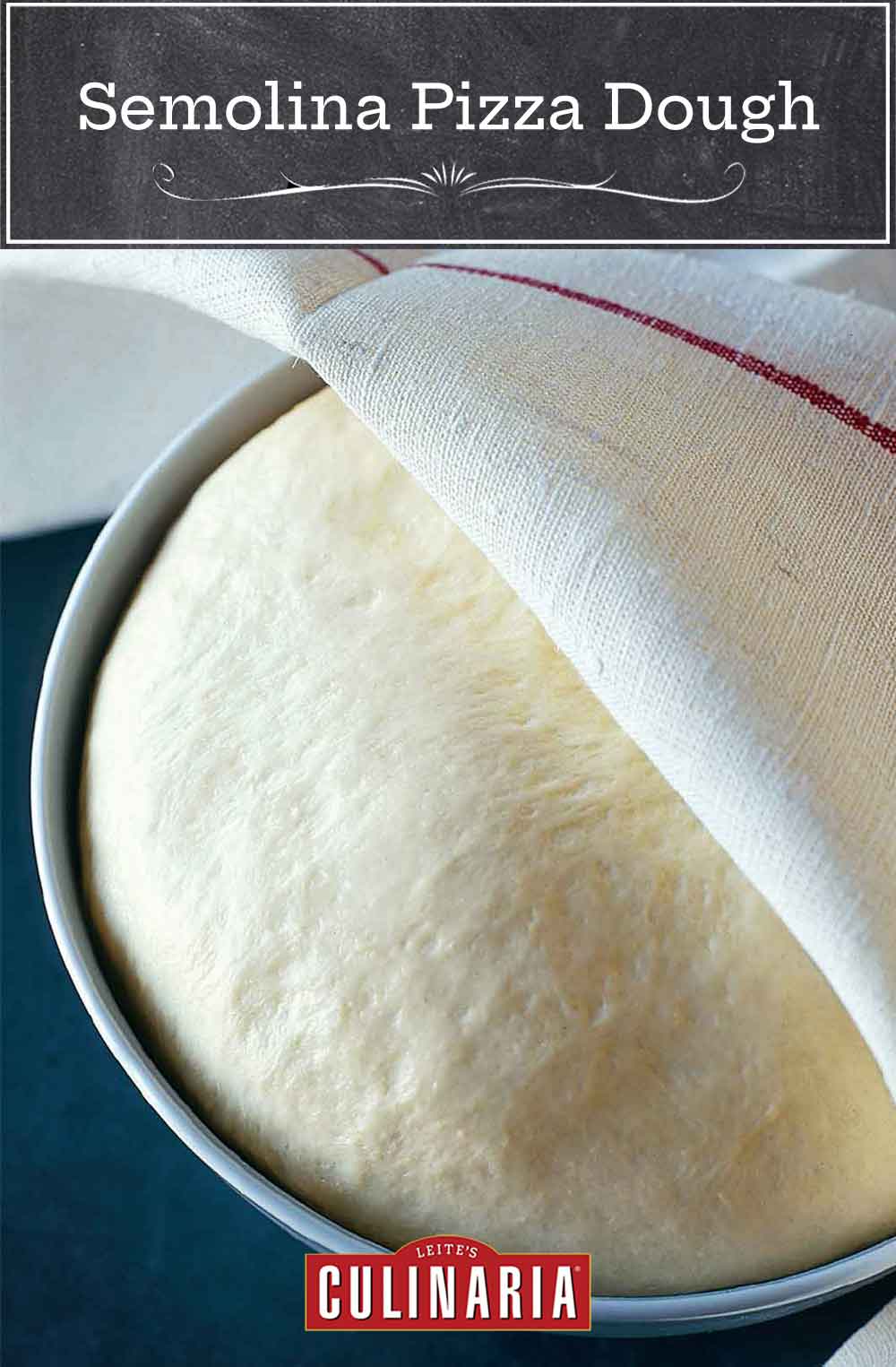
Semolina is a protein-rich flour that makes this dough resilient and gives the baked crust a hearty chew and tooth-sinking texture. [Editor’s Note: It’s not every day that we hear of a pizza crust being described as having a “tooth-sinking” texture, as author Brigit Binns describes it. But you know what? That odd little turn of the phrase is an astoundingly accurate adjective. You may wish to consider adding it to your lexicon, just as you may wish to add this pizza crust to your repertoire.]–Brigit Binns
Semolina Pizza Dough FAQs
The simple answer: Any! We have a ton of pizza recipes on this site, and our some of our favorites are New York-style pizza, potato bacon pizza, pepperoni pan pizza, Meatball Pizza, and broccoli rabe pizza.

Semolina Pizza Dough
Ingredients
- 1/4 cup warm water [110°F (43°C)]
- 1 teaspoon granulated sugar
- 1 package (2 1/4 teaspoons) active dry yeast
- 1 cup room-temperature water, plus more as needed
- 1 tablespoon mild olive or vegetable oil, plus more for the bowl
- 2 cups plus 2 tablespoons fine semolina flour
- 1 cup plus 7 tablespoons all-purpose flour, plus more for the work surface
- 2 to 3 teaspoons Diamond kosher salt
Instructions
- In a measuring cup or small bowl, stir together the warm water and the sugar. Sprinkle with the yeast and let stand until it starts to foam, about 5 minutes.
- Add the room-temperature water and the olive oil to the foaming yeast concoction. Let it rest for a moment.
- In a food processor, combine the semolina and all-purpose flours and the salt. With the motor running, add the yeast mixture in a steady stream and then pulse until the dough comes together in a rough mass, about 12 seconds. (If the dough doesn't form a ball, sprinkle it with 1 to 2 teaspoons of cold water and pulse again until a rough mass forms.) Let the dough rest in the processor bowl for 5 to 10 minutes.
- Process the dough again for 25 to 30 seconds, steadying the top of the food processor with one hand. The dough should be tacky to the touch but not sticky.
- Transfer the dough to a lightly floured work surface and form it into a smooth ball. Place the dough in a large oiled bowl, turn the dough to coat with oil, and cover the bowl with plastic wrap. Let the dough rise in a warm place until doubled in size and spongy, about 1 1/2 hours.
- Turn the dough out onto a lightly floured work surface, gently punch it down, and shape it into a smooth cylinder. Divide the dough into 2 equal portions. Shape each portion into a smooth ball, dusting with flour only if the dough becomes sticky.
- Cover both balls of dough with a clean kitchen towel and let rest for 10 minutes before proceeding with your pizza recipe. (You can freeze the balls of dough in gallon-size resealable plasic bags, being sure to squeeze as much of the air as possible out of the bag, for up to 2 months. Thaw the frozen dough for 3 to 4 hours at room temperature.)

Nutrition
Nutrition information is automatically calculated, so should only be used as an approximation.
Recipe Testers’ Reviews
I was very pleased with how easy this semolina pizza dough was to make as well as with the flavor of the finished product. I’d been interested in trying semolina flour for pizza dough, and after making this, I want to explore it further.
I liked that the recipe yielded enough dough for multiple pizzas. The recipe says to let the dough rise in a warm place. It would be helpful for some people to know where and how to do that. For example, they can turn their oven on to the lowest setting for about 5 minutes, turn the oven off, and then put the dough into the oven. After the dough is made and divided into 2 pieces, the recipe tells you that after letting it rest for 10 minutes, you can use it or freeze it.
I wanted to use half of the dough later that day and then use the other half the next morning. Not having a lot of experience with dough, I was just assuming that it would work to refrigerate the remaining dough overnight. Someone who needs everything spelled out for them might take the recipe very literally and feel that they either had to bake the pizza right then and there or else throw the dough into the freezer.
This dough was incredibly easy to work with and stretch and it held its shape. It makes a fairly thick crust and can stand up to a lot of toppings. We loaded ours up with cooked crumbled sausage, peppers, mushrooms, onions, and plenty of cheese. It was excellent though very filling.
I froze the second crust, wrapped it in plastic wrap, and used it a couple of months later and it was just as good as fresh.













All I could taste was the salt. I didn’t even put the full tbsp in as it just seemed like too much. Are you sure you don’t mean tsp?
We’re so sorry that you found it too salty, Dirk. Your pizza certainly looks amazing! Depending on the type of salt you use, the saltiness will vary. We’ve updated the recipe to include a range so that if you are using a finer salt, you could use less. Do let us know how it turns out if you try it again with less and how much you used.
Hello and Grazi!
Just read through all the comments and like others, wanted to find a recipe for fine semolina. I knew that 00 would be OK to sub for AP. In the middle of the first rise right now and like the other poor soul that used ‘Bob’s Fine Semolina’, warm water (~ 105-108), great looking yeast, I am finding this dough rock hard and hardly rising. I have had it in a room that is about 82 degrees and slightly humid.
I would love some feedback, and will also report back about the final product. I’m beginning to wonder if it is the ‘Bobs’? Again, thanks SO much, I am determined to get this right!
It could be the semolina, Loretta, if others have had similar experience with that brand. If your yeast is fresh and active, and it sounds like it is, and you’ve got a nice warm room, that dough should be soft and happily rising. I live in a much cooler climate and have never had difficulty with this dough.
Thank you for your thoughts. I will track down some’fine’ semolina flour from another source and report back. My husband (Pizza Monster) said it was edible, but I know what I’m going for and this was definitely not like the other results.
Cheers!
Please do, Loretta. I’m curious to hear what you discover and it will be very helpful to our other readers, too.
What temp did you cook the pizza at?
Jennifer, the dough us mean to go with whatever pizza recipe you want to make. The pizza recipe itself will state the temperature. Here is a list of our favorites.